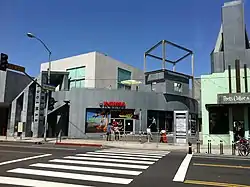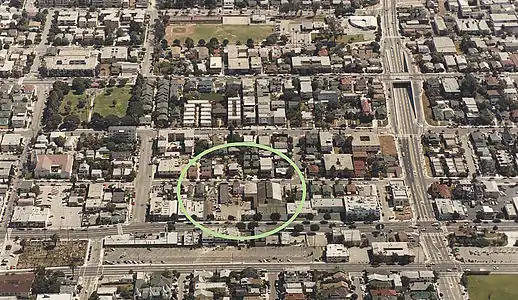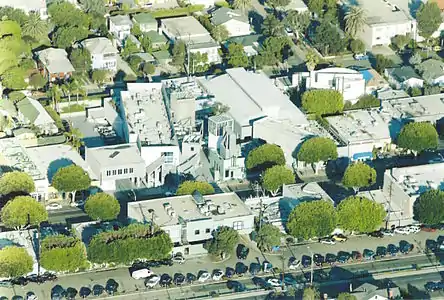Edgemar
Edgemar, located at 2415–2449 Main Street in Santa Monica, California, is a mixed-use shopping center designed by architect Frank Gehry that combines early 19th century warehouses, a 1940s Art Deco office building and new construction.
| Edgemar | |
|---|---|
 Main Facade of Edgemar | |
| General information | |
| Location | Santa Monica, CA |
| Address | 2415–2449 Main Street |
| Country | USA |
| Coordinates | 34.0033704°N 118.4849574°W |
| Construction started | 1984 |
| Completed | 1988 |
| Technical details | |
| Floor area | Retail: 15,779 ft (4,809 m) Office: 8,106 ft (2,471 m) Restaurant: 3,405 ft (1,038 m) Theater Center: 6,350 ft (1,940 m) plus mezzanine Artist Lofts: 1,886 ft (575 m) plus mezzanine |
| Design and construction | |
| Architect(s) | Buildings: Frank O. Gehry and Associates, Inc. Landscape: Emmet Wemple[1] |
| Developer | Sher Development |
| Website | |
| www.edgemar.com | |
History
1908–1984
In 1908, the Imperial Ice Company built an 8,000 square foot warehouse at the back of its property at 2435 Main Street in Santa Monica, California. Another 3,000 square foot warehouse was added beside it in 1928.
With the advent of refrigeration in the 1940s leading to a decline in the ice business, the Santa Monica Dairy Company, minority partners in the Imperial Ice Company, bought the property for the egg-processing division of their dairy. The Santa Monica Dairy Company, founded by Swiss immigrant Herman Michel, was the oldest dairy in Los Angeles County.[2]
The company built a small Art Deco-style building with Main Street frontage for their offices. The 1908 warehouse became their "egg-candling room" in which eggs were held up to light to check for fertilization. The company's name was later changed to Edgemar Farms.[3]
In 1983, the Michel Brothers sold their company to Foremost Dairy and placed the Main Street property on the market.[4]
1984–2007
In 1984, Thomas Eatherton, an artist whose studio was in a 2,000 square foot metal outbuilding on the north end of the site, showed neighbor Abby Sher, who had a family history of development,[5] the original ice warehouse with its 25-foot ceilings, clerestory windows, and 8,000 square feet of clear span, and suggested its use as a museum. Sher took the suggestion as the impetus for creating a small piazza-like setting with the museum as its centerpiece. Influences were the Tuscan hill town of Volterra, with its central piazza containing, along with the usual shops and cafes, an Etruscan museum and a large fresco-adorned municipal building;[6] and the 1948 neighborhood shopping center, The Brentwood Country Mart.[7] Sher purchased the Edgemar Farms property in October 1984, and retained the use of the name, Edgemar, for the development.
In the early 1980s, the model of melding art with commerce was being widely explored as a way to support art institutions. In planning or under construction at the time were the California Plaza project that incorporated the Museum of Contemporary Art, Los Angeles; the expansion of the Museum of Modern Art, New York, funded through the sale of zoning rights for the Museum Tower project; and the Orange County Performing Arts Center, which opened in 1986 as part of South Coast Plaza.[8]
Locally, the Edgemar project was part of wider restoration and adaptive reuse activities that included the Santa Monica Pier and Carousel and the transformation of the 1894 Roy Jones house into the Heritage Square Museum.[9]
Sher selected architect Frank Gehry to design Edgemar, in part because many of his early projects included renovated and new construction, his then predilection for modest materials including galvanized metal, chain link, concrete, and stucco—all materials found on the original site—and because of his early experience working in the office of Victor Gruen Associates, premier shopping center architects.[10]
The 50,000 square foot Edgemar site's zoning was split down the middle—commercial on Main Street and residential on Second Street, but the 1908 warehouse and its 1928 addition were located in the residentially zoned portion of the property. A Conditional Use Permit was required to transform the original Imperial Ice Company warehouse buildings to accommodate a restaurant and museum as well as retail and office spaces.[11]

In hearings before the Santa Monica Planning Commission, the Santa Monica City Council, and the California Coastal Commission, the development enjoyed strong backing from the art community, but encountered resistance from neighboring residents who were concerned about the impact to the neighborhood on parking, traffic, and noise.[12] With design modifications that included additional parking and the building of a sound barrier that doubled as a planter, the project was approved in August 1988.[13]
The 1908 warehouse, earthquake retrofitted, and with a mezzanine added, became home to the newly formed Santa Monica Museum of Art (SMMOA). The 1928 warehouse addition was converted to restaurant space. Of the 1940s art deco Edgemar office building, only the front wall with its art deco façade was retained; the new northwest wall was faced in green tile. Other new construction included a 2-story building for ground floor retail and second story office use, and a parking lot with one level of underground parking.
When construction was completed in 1988, Edgemar comprised roughly 16,000 square feet of space for retail, 8,000 square feet for office, 3,500 square feet for the restaurant, and 8,000 square feet, plus mezzanine, for the museum.[14] In 1997, 6,000 square feet of the museum space was converted into a theater center, and the remaining 2,000 square feet became Second Street-facing artist lofts. These modifications were designed by Koning Eizenberg Architecture.

Tenants
Museum
Santa Monica Museum of Art (SMMOA)
Curator Hal Glicksman served as the museum's director during the planning phase.[15]
Thomas Rhodes served as the museum's director from 1988 until 1998. The first exhibition under Rhodes' leadership, Art in The Raw, took place in the raw space before the interior build out was completed. This exhibition ran from July 21, 1988 through January 7, 1989, and included works by Michael Brewster, David Bunn, Meg Cranston, Daniel J. Martinez, Bryan Pezzone, Mineko Grimmer, Carl Stone, and May Sun.[16]
In the fall of 1989, SMMOA held its inaugural exhibition in the finished space, Bon Angeles, organized in association with the Goethe Institute, Los Angeles, which brought eight artists from Düsseldorf, Germany for six weeks to use SMMOA as a studio and exhibition space. The artists included in this exhibition were Hilmar Boehle, Ernst Hesse, Marcel Hardung, Adolphe Lechtenberg, Annette Leyener, Julia Lohmann, Wasa Marjanov, and Manfred Müller.[17]
The Santa Monica Museum of Art left Edgemar at the end of December 1996 and re-opened in Bergamot Station in 1998.[18]
Retail
The first businesses to open in Edgemar were the Gallery of Functional Art (August 1988 – 1994), which featured artist and architect-designed furniture and other functional objects; the first Ben & Jerry's Ice Cream west of Chicago (January 1989 – Present); and Röckenwagner Restaurant, which opened in the summer of 1991 and operated until 2006.[13][19]
Other first generation tenants were Monsoon – an Asian import store (1989–1991); Quarterdeck/DESQaway – a remote office, and international newsstand (1989–1994); KikiLeweeBaby – Women's accessories and men's furnishings (1991–1994); Highlights – Designer lighting (1989–2007); Harriett Dorn Children – Children's clothing (1990–1994); Buffalo – Men's and women's designer clothing (1991–1996); Bannatyne Gallery – Craftsman furniture and antiques (1994–1997); and the Gallery of Contemporary Photography (1991–1995). In 1995, the Museum of Contemporary Art opened a museum gift store at Edgemar.[20]
Current tenants (2015) tenants include: Buffalo Exchange, Blue Bottle Coffee, Santa Monica Travel & Tourism, Ben & Jerry's Ice Cream, Brick & Mortar Restaurant (in the space formerly occupied by Röckenwagner), Edgemar Center of the Arts, Hale Arts, Bomb Shell, Santa Monica Cross Fit.
Office
Mad River Post, a post-production facility, occupied most of the second floor offices for eighteen years (1989–2007).
Theater
The center hosts the Edgemar Center for the Arts, a collaborative rehearsal performance space. The arts center was founded in 1999 by Michelle Danner and Larry Moss and opened in 2002.[21] The arts center is a self-supporting non-profit that hosts plays, classes, and summer camps.[21]
Artist Lofts
There are two live/work artist lofts, each 1,310 square feet, along 2nd Street in the eastern end of the former museum space.[22]
Holidays
In 1995, Anthony Schmitt designed and constructed the first Edgemar Holiday Tree using shopping carts as his construction module. Every year since then, with one exception, Schmitt and his team have constructed the unique shopping cart tree. In 2012 the tree was made up of 86 shopping carts and measured thirty-three feet tall, with some smaller carts at the top to creating a forced perspective giving the illusion of even greater height.[23]
The tree is assembled by hand just before Thanksgiving each year. When the construction is complete, it is decorated with lights and ornaments. Carolers sing and cider is served in conjunction with the Main Street Holiday Festival.[24]
Summer Soulstice: Each summer since 1992, and most recently in conjunction with The Main Street summer solstice festival, Edgemar hosts musical performances in the courtyard.[25]
Art and Design
Courtyard
Edgemar Fountain by Thomas Eatherton[26]
Umbrellas by Gregg Fleishman[27]
Wind Sculpture by Paul Chilkov[28]
Subterranean Parking Garage LISTEN EDGEMAR, a permanent sound installation created by Hugh Livingston and Michael Zbyszynski in Edgemar's subterranean parking garage, opened May 16, 2004. Fourteen speakers are installed in the ceiling of the garage. The installation incorporates "found sounds" from the Edgemar environment and recordings of improvisations by Jessica Catron (cello), Vinny Golia (woodwinds), Paul Livingstone (sitar), Pauline Oliveros (accordion), Jeremy Drake (guitar), and Philip Gelb (shakuhachi) in response to those sounds. Sounds and music are constantly sampled from a computer in the garage. New sounds come in and go out in conjunction with high and low tides at the Santa Monica Pier.[29]
References
- Thomas, Jr., Robert McG. (June 17, 1996). "E. Wemple, 75; Shaped Landscape Of Los Angeles". The New York Times. Retrieved November 17, 2014.
- Friedman, Arnie (August 20, 1988). "Through Pioneer Eyes: 80 Years of Life in Santa Monica". Santa Monica Evening Standard. pp. 13, 15.
- Gabriel, Louise B.; Santa Monica Historical Society (2006). Early Santa Monica. Images of America. Charleston, SC: Arcadia Publishing. p. 93.
- "Alumni News: Deaths: Walter James Michel". USC Trojan Family Magazine. Spring 1997. Archived from the original on March 4, 2016. Retrieved December 2, 2015.
- For Sydney Sher, see "Sydney Sher Mall Developer and a Lawyer, Is Dead at 75". The New York Times. August 12, 1983. For Merritt Sher, see Svetcov, Danielle (August 5, 2001). "A Philosopher of Place / Where Others See Rubble, Developer Merritt Sher Sees Xanadu, and He's Envisioning His Next in Downtown Oakland". San Francisco Chronicle. For Ron Sher, see Dietrich, William (November 9, 2003). "Community Builder: In Ron Sher's 'Third Places,' People Come First". The Seattle Times: Pacific Northwest Magazine. Retrieved November 24, 2014.
- Colker, David (August 21, 1988). "Bridging the Chasm Between Culture and Commerce". Los Angeles Times. pp. 98, 100.
- For Brentwood Country Mart, see "Brentwood Country Mart History". Archived from the original on November 22, 2014. Retrieved November 24, 2014.
- Guenther, Robert (April 18, 1984). "Novel Links with Developers Give Arts Institutions a Boost". The Wall Street Journal. p. 35.
- "California Heritage Museum: History of the Roy Jones House". Archived from the original on February 4, 2015. Retrieved November 24, 2014.
- Kimmelman, Michael (September 4, 1988). "An Old Ice Warehouse Is Sculpted Into a Museum". The New York Times.
- Morgenthaler, Anne (June 12, 1985). "Edgemar Farms Art Museum Wins Approval". Santa Monica Evening Outlook.
- Morgenthaler, Anne (October 12, 1986). "Work to Start on Transforming Edgemar Site Into Art Museum". Santa Monica Outlook.
- Birnbaum, Jane (November 14, 1988). "Edgemar Complex Is a Work of Art". Los Angeles Herald Examiner. Yarnall, Louise (August 10, 1988). "SM Extends Hours for Restaurant". Santa Monica Outlook.
- Wilkinson, Tracy (February 18, 1988). "Museum-Retail Project Nearing completion on Santa Monica's Main St". Los Angeles Times. Saee, Michele (January 18, 1989). "Gehry on Main Street". The Architects' Journal.
- Stevens, Jan (November 23, 1984). "Art Museum Planned for Old Building". Santa Monica Outlook.
- "SMMOA's First Pre-Opening Series: Art in the Raw". Santa Monica Museum of Art Newsletter. Vol. 1, no. 1. Summer 1989. p. 1.
- "SMMOA Opens September 15th with Bon Angeles". Santa Monica Museum of Art Newsletter. Vol. 1, no. 1. Summer 1989. p. 1.
- Rubin, Saul (December 2, 1996). "Artful Behavior: Santa Monica Museum Says Bye-Bye to Main Street". Santa Monica Outlook.
- Moosbrugger, Ed (October 23, 1991). "Trendy Shopping Area Seen as Defying Economic Gloom". Santa Monica Outlook.
- Venice Family Clinic Art Walk Ad Book. 1993–1995.
- Spitz, Sarah A. (2020-01-02). "Michelle Danner at Edgemar". Santa Monica Daily Press. Retrieved 2021-04-04.
- "Edgemar Plans Should Get OK". Santa Monica Outlook. August 12, 1997.
- Scmitt, Anthony. "The Shopping Cart Tree". Archived from the original on December 18, 2014. Retrieved December 8, 2014.
- "Shopping Cart, Oh Shopping Cart". Santa Monica Daily Press. 2005.
- "Main Street Summer Soulstice Celebration Spotlights Musical Past and Future Sunday". Santa Monica Mirror. June 22, 2005. Retrieved December 8, 2014.
- "Thomas Eatherton". Retrieved December 2, 2015.
- "Gregg Fleishman". Retrieved December 2, 2015.
- "Paul Chilkov". Retrieved December 2, 2015.
- Livingston, Hugh. "Listen Edgemar". Livingston Sound. Archived from the original on March 26, 2015. Retrieved December 8, 2014.